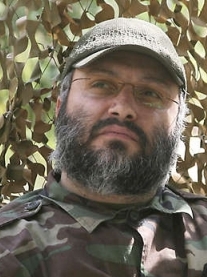 A death in Damascus
A death in Damascus
By Roger Morris, War in Context, February 24, 2008
It was another car bomb in the Middle East, the victim this time one of those “notorious terrorists” seemingly generic to the landscape. Hezbollah’s Imad Mughniyeh died February 12 in Damascus as he lived most of his forty-five years, in that world of searing blast, mutilation, mayhem, and aftershock of cold fear.
Yet behind fleeting, often hackneyed reports of his death, he was no ordinary figure in the long blood-red line of killers and killed. Given a murderer’s good-riddance by Washington and Jerusalem while a martyr’s memorial from Gaza and Beirut to Baghdad and Tehran, Mughniyeh was emblematic of the gulf between worlds—of atrocities and abject failure of statesmanship on all sides, in which American policy has its own half-century share.
 Millions on his head, Mughniyeh led a largely unseen life. But some of its milestones can be glimpsed from the archive of the past fifty years in the Middle East. It is in part the story of a man, a country, a region pitted against the United States in a shadow war of intervention and resistance, attack and reprisal, most Americans never saw.
Millions on his head, Mughniyeh led a largely unseen life. But some of its milestones can be glimpsed from the archive of the past fifty years in the Middle East. It is in part the story of a man, a country, a region pitted against the United States in a shadow war of intervention and resistance, attack and reprisal, most Americans never saw.
No outrage or theology of the oppressed can rationalize the savagery of a Mughniyeh, spiraling vengeance that leaves the non-state terrorist—or the government practicing its own version in the guise of “special operations” or covert action—no better than the evil they claim as justification, and their cause ultimately no less betrayed. But there will be no end to reciprocal brutality and defeat in the Middle East until the history Mughniyeh embodies is understood.
Born in 1963 to Shiite peasant parents in Tayr Dibba, a village in impoverished southern Lebanon, he grew up in a cinder block house with no running water in a Levant of vast inequity, where pre-World War II French colonialism and then postwar U.S. support heedlessly fastened Western control with the proxy political-economic repression by the Maronite Christian minority with its avowedly fascist Phalangist party and militia. That client tyranny, masked by Beirut’s cosmopolitan façade, was perpetuated by the 1958 military intervention of US Marines and the ensuing CIA corruption of Lebanese politics through the 1970s, including millions in covert subsidies to the Phalange and numerous Lebanese politicians.
He was nine in July 1972 when near where he lived in south Beirut’s Shiite slums the city’s first car bomb, planted by the Israelis in retaliation for the recent Lod Airport massacre, blew up the spokesman of the group behind the Lod attack, Palestinian poet Ghassan Kanafani, along with his 17-year-old niece Lamees with him for a shopping trip.
Mughniyeh was thirteen in 1976 when the CIA and Israel covertly backed the invasion of Lebanon by Syria to thwart the emergence of a broad nationalist coalition representing the country’s Islamic majority and supported by the Palestinian Liberation Organization.
He was an eighteen-year-old engineering student at the American University of Beirut in 1981 when the U.S. gave a “green light” to the Israeli invasion of Lebanon in pursuit of the PLO.
He was nineteen in the summer of 1982 when the Israeli Army, with covert U.S. aid, laid siege to Beirut, raking the city with artillery, devastating Shiite neighborhoods. (Osama bin Laden would say later it was the attacks on Beirut’s high-rise apartment buildings that prompted him to retaliate against New York skyscrapers.)
By 1982, like several of his boyhood soccer team, teenage Mughniyeh joined the combined PLO and Lebanese nationalist resistance to the invasion, becoming a sniper along the Green Line. He watched that September as the West negotiated the PLO’s exit from Lebanon with guarantees that U.S. and other peacekeeping troops would protect Palestinian refugee camps from reprisal by hostile Lebanese factions—only to see the US Marine force swiftly withdrawn, leaving Lebanese militias to massacre helpless hundreds at the Shatila and Sabra camps as Israeli forces looked on. Even US officials, Secretary of State George Shultz and National Security Advisor Robert McFarlane, would call the episode “treacherous” and “criminal.”
In April 1983, a bombing of the US Embassy in Beirut killed several CIA agents pivotal in past covert actions in Lebanon, an attack Mughniyeh was later accused of “masterminding.” But there would be no real evidence of his role—only that the bombing was in retaliation for the Marine withdrawal allowing the Shatila and Sabra slaughter as well as earlier interventions.
He was twenty in September 1983 when the U.S. Sixth Fleet intervened in the Lebanese Civil War by firing on rebel forces fighting the reactionary Phalangist regime, the USS Virginia and John Rodgers pounding hills above Beirut with 24,000 pounds of ordnance, soon followed by the battleship New Jersey’s small car-size 2,000-pound shells inflicting untold civilian as well as combatant casualties.
On October 23, 1983, a truck bomb with 12,000 pounds of explosives killed 241 Marines quartered at the Beirut Airport after being sent back to Lebanon. U.S. officials later accused Mughniyeh in the attack, though again there would be no evidence—only that the assault on the Marines was in retaliation for the U.S. naval shelling and other interference in Lebanon’s civil war. “We still do not have the actual knowledge of who did the bombing of the Marine barracks at the Beirut Airport,” Caspar Weinberger, the Secretary of Defense at the time, told PBS in 2001, “and we certainly didn’t then.”
A turning point came for Mughniyeh came in 1985 when he was a twenty-two-year-old bodyguard to Sheikh Mohammad Hussein Fadlallah. A fiery preacher, spiritual mentor to many in the rising political consciousness of Lebanon’s Shiite community, Fadlallah took no political role, opposed violence and sectarian division, and defied growing Iranian influence in Lebanon. But on March 8, 1985—in reprisal for the Marine barracks bombing, and in an operation goaded by the Israelis and funded by the Saudis, both of whom saw Fadlallah as a threat to their own interests in Lebanon—the CIA tried to car-bomb Fadlallah. By chance the cleric escaped harm, but the huge explosion ravaged the poor Shiite area where he lived, wounding 200 and killing 80, among them Fadlallah’s bodyguards and Mughniyeh’s close friends. The next day, a banner hung over the smoking ruins—“Made in the USA.”
With the Fadlallah bombing, Mughniyeh joined the terrorist arm of the increasingly militant political impulse among Lebanon’s Shiites from which Hezbollah soon emerged, and as the resistance movement’s chief of security and intelligence, he joined one of history’s more vicious chain reactions.
Later in 1985 he reportedly interrogated kidnapped CIA agent William Buckley who soon died in captivity, and whose abduction set in motion the Washington sequel of trading arms for hostages that led to the Iran-Contra scandal.
In July 1985 he was involved in the hijacking of TWA Flight 847 with the brutal killing of U.S. Navy diver Robert Stethem, for which Mughniyeh and others were indicted by an American court.
In 1988, he was implicated in the kidnapping and murder of Marine Colonel William Higgins serving with UN peacekeeping forces in Lebanon, a crime a U.S. official would describe as a “blood debt” driving Washington’s further intervention in Lebanon and the region.
Over the 1980s, Mughniyeh conducted much of the Middle East’s shadowy minuet with Washington in which dozens of Western hostages were taken and traded for American arms for the Palestinians and Iranians as well as Hezbollah—the U.S. feeding Iran weapons in its 1980s war with Iraq while supplying the Iraqis intelligence on Iran in a ruthless policy of bleeding both.
Mughniyeh evaded numerous U.S. and Israeli attempts to assassinate him, including a 1994 car bomb that killed his brother. Become mythic, in the West a faceless monster, in the Middle East a tall, handsome, well-dressed hero fluent in English and French, he was widely credited with historic feats, including the deployment of armor-piercing roadside bombs driving Israeli forces from Lebanon in 2000 and 2006, and plaguing the U.S. occupation of Iraq. “When in doubt, and we are always in doubt about this,’ said an ex-CIA official, “blame Mughniyeh.”
His death, predictably, was shrouded in intrigue and menace. As Hezbollah threatened revenge, there were reports that he had been planning some retaliation for the recent Israeli bombing of Syria, that the headrest explosive in his SUV was triggered by satellite as only the U.S. or Israel could have managed, that some of his Syrian hosts may have conspired with the CIA in some new cabal, or even that the killing was faked so that he could go still deeper underground. In the old ceaseless, senseless cycle, reprisals were in the offing.
About his life, as Churchill said of historical tragedy, the terrible ifs accumulate. If in a Lebanon free of any real cold war Russian threat the West had not so reflexively and so long colluded with the colonial oligarchs against a political-economic democracy bringing long-term stability. If there had been from any side an equitable peace between Palestinians and Israelis. And perhaps most decisively, if the U.S. had not continuously thrown its vast weight into the scales—furtively if not always openly—with so little knowledge and sensibility that it ended with enemies America and its Israeli client need never have made.
How history will see Mughniyeh—vicious killer, fierce patriot, or both—will depend, of course, on who writes it in the era’s clashing dogmas. If only his death could teach, this figure who killed so many might yet save lives. But so long as the world’s greatest power lacks the wisdom and courage to face its past culpability and change its course in the Middle East, the key to so much else in its policies at home as well as abroad, one outcome seems sure. In some cinder block hovel in south Beirut, the rubble of Gaza, or the walled-in ghettos of the West Bank, some young man, or woman, is waiting to take his place.
© Roger Morris
(A shorter version of this article ran in Canada’s Globe and Mail February 23.)
Roger Morris, who served on the Senior Staff of the National Security Council under Presidents Johnson and Nixon before resigning over the invasion of Cambodia, is an award-winning historian and author of several books, including Shadows of the Eagle a history of US policy and covert action in the Middle East and South Asia, forthcoming from Knopf in 2008.


 Millions on his head, Mughniyeh led a largely unseen life. But some of its milestones can be glimpsed from the archive of the past fifty years in the Middle East. It is in part the story of a man, a country, a region pitted against the United States in a shadow war of intervention and resistance, attack and reprisal, most Americans never saw.
Millions on his head, Mughniyeh led a largely unseen life. But some of its milestones can be glimpsed from the archive of the past fifty years in the Middle East. It is in part the story of a man, a country, a region pitted against the United States in a shadow war of intervention and resistance, attack and reprisal, most Americans never saw.